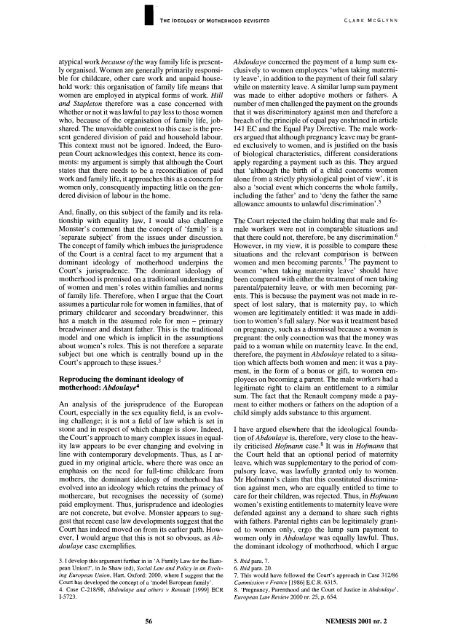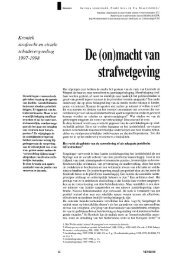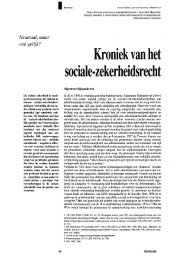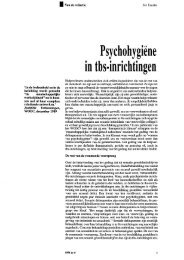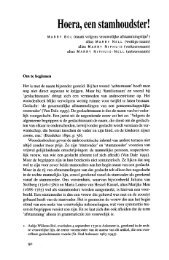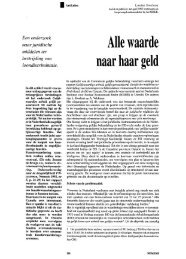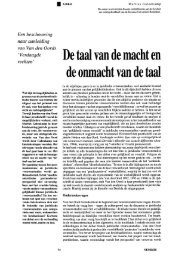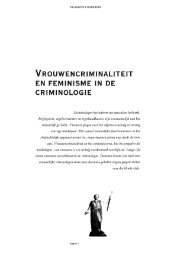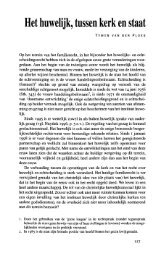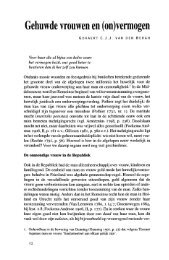maart/april 2001 de moederschapsideologie van het ... - Nemesis
maart/april 2001 de moederschapsideologie van het ... - Nemesis
maart/april 2001 de moederschapsideologie van het ... - Nemesis
Create successful ePaper yourself
Turn your PDF publications into a flip-book with our unique Google optimized e-Paper software.
I THE<br />
atypical work because of the way family life is presently<br />
organised. Women are generally primarily responsible<br />
for childcare, other care work and unpaid household<br />
work: this organisation of family life means that<br />
women are employed in atypical forms of work. HUI<br />
and Stapleton therefore was a case concerned with<br />
w<strong>het</strong>her or not it was lawful to pay less to those women<br />
who, because of the organisation of family life, jobshared.<br />
The unavoidable context to this case is the present<br />
gen<strong>de</strong>red division of paid and household labour.<br />
This context must not be ignored. In<strong>de</strong>ed, the European<br />
Court acknowledges this context, hence its comments:<br />
my argument is simply that although the Court<br />
states that there needs to be a reconciliation of paid<br />
work and family life, it approaches this as a concern for<br />
women only, consequently impacting little on the gen<strong>de</strong>red<br />
division of labour in the home.<br />
And, finally, on this subject of the family and its relationship<br />
with equality law, I would also challenge<br />
Monster's comment that the concept of 'family' is a<br />
'separate subject' from the issues un<strong>de</strong>r discussion.<br />
The concept of family which imbues the jurispru<strong>de</strong>nce<br />
of the Court is a central facet to my argument that a<br />
dominant i<strong>de</strong>ology of motherhood un<strong>de</strong>rpins the<br />
Court's jurispru<strong>de</strong>nce. The dominant i<strong>de</strong>ology of<br />
motherhood is premised on a traditional un<strong>de</strong>rstanding<br />
of women and men's roles within families and norms<br />
of family life. Therefore, when I argue that the Court<br />
assumes a particular role for women in families, that of<br />
primary childcarer and secondary breadwinner, this<br />
has a match in the assumed role for men - primary<br />
breadwinner and distant father. This is the traditional<br />
mo<strong>de</strong>l and one which is implicit in the assumptions<br />
about women's roles. This is not therefore a separate<br />
subject but one which is centrally bound up in the<br />
Court's approach to these issues. 3<br />
Reproducing the dominant i<strong>de</strong>ology of<br />
motherhood: Abdoulaye*<br />
An analysis of the jurispru<strong>de</strong>nce of the European<br />
Court, especially in the sex equality field, is an evolving<br />
challenge; it is not a field of law which is set in<br />
stone and in respect of which change is slow. In<strong>de</strong>ed,<br />
the Court's approach to many complex issues in equality<br />
law appears to be ever changing and evolving in<br />
line with contemporary <strong>de</strong>velopments. Thus, as I argued<br />
in my original article, where there was once an<br />
emphasis on the need for full-time childcare from<br />
mothers, the dominant i<strong>de</strong>ology of motherhood has<br />
evolved into an i<strong>de</strong>ology which retains the primacy of<br />
mothercare, but recognises the necessity of (some)<br />
paid employment. Thus, jurispru<strong>de</strong>nce and i<strong>de</strong>ologies<br />
are not concrete, but evolve. Monster appears to suggest<br />
that recent case law <strong>de</strong>velopments suggest that the<br />
Court has in<strong>de</strong>ed moved on from its earlier path. However,<br />
I would argue that this is not so obvious, as Abdoulaye<br />
case exemplifies.<br />
3.1 <strong>de</strong>velop this argument further in in 'A Family Law for the European<br />
Union?', in Jo Shaw (ed), Social Law and Policy in an Evolving<br />
European Union, Hart, Oxford: 2000, where I suggest that the<br />
Court has <strong>de</strong>veloped the concept of a 'mo<strong>de</strong>l European family'.<br />
4. Case C-218/98, Abdoulaye and others v Renault [1999] ECR<br />
1-5723.<br />
IDEOLOGY OF MOTHERHOOD REVISITED CLARE MCGLÏNN<br />
Abdoulaye concerned the payment of a lump sum exclusively<br />
to women employees 'when taking maternity<br />
leave', in addition to the payment of their full salary<br />
while on maternity leave. A similar lump sum payment<br />
was ma<strong>de</strong> to either adoptive mothers or fathers. A<br />
number of men challenged the payment on the grounds<br />
that it was discriminatory against men and therefore a<br />
breach of the principle of equal pay enshrined in article<br />
141 EC and the Equal Pay Directive. The male workers<br />
argued that although pregnancy leave may be granted<br />
exclusively to women, and is justified on the basis<br />
of biological characteristics, different consi<strong>de</strong>rations<br />
apply regarding a payment such as this. They argued<br />
that 'although the birth of a child concerns women<br />
alone from a strictly physiological point of view', it is<br />
also a 'social event which concerns the whole family,<br />
including the father' and to '<strong>de</strong>ny the father the same<br />
allowance amounts to unlawful discrimination'. 5<br />
The Court rejected the claim holding that male and female<br />
workers were not in comparable situations and<br />
that there could not, therefore, be any discrimination. 6<br />
However, in my view, it is possible to compare these<br />
situations and the rele<strong>van</strong>t comparison is between<br />
women and men becoming parents. 7 The payment to<br />
women 'when taking maternity leave' should have<br />
been compared with either the treatment of men taking<br />
parental/paternity leave, or with men becoming parents.<br />
This is because the payment was not ma<strong>de</strong> in respect<br />
of lost salary, that is maternity pay, to which<br />
women are legitimately entitled: it was ma<strong>de</strong> in addition<br />
to women's full salary. Nor was it treatment based<br />
on pregnancy, such as a dismissal because a woman is<br />
pregnant: the only connection was that the money was<br />
paid to a woman while on maternity leave. In the end,<br />
therefore, the payment in Abdoulaye related to a situation<br />
which affects both women and men: it was a payment,<br />
in the form of a bonus or gift, to women employees<br />
on becoming a parent. The male workers had a<br />
legitimate right to claim an entitlement to a similar<br />
sum. The fact that the Renault company ma<strong>de</strong> a payment<br />
to either mothers or fathers on the adoption of a<br />
child simply adds substance to this argument.<br />
I have argued elsewhere that the i<strong>de</strong>ological foundation<br />
of Abdoulaye is, therefore, very close to the heavily<br />
criticised Hofmann case. 8 It was in Hofmann that<br />
the Court held that an optional period of maternity<br />
leave, which was supplementary to the period of compulsory<br />
leave, was lawfully granted only to women.<br />
Mr Hofmann's claim that this constituted discrimination<br />
against men, who are equally entitled to time to<br />
care for their children, was rejected. Thus, in Hofmann<br />
women's existing entitlements to maternity leave were<br />
<strong>de</strong>fen<strong>de</strong>d against any a <strong>de</strong>mand to share such rights<br />
with fathers. Parental rights can be legitimately granted<br />
to women only, ergo the lump sum payment to<br />
women only in Abdoulaye was equally lawful. Thus,<br />
the dominant i<strong>de</strong>ology of motherhood, which I argue<br />
5. Ibidpaia. 7.<br />
6. Ibid para. 20.<br />
7. This would have followed the Court's approach in Case 312/86<br />
Commission v France [1986] E.C.R. 6315.<br />
8. 'Pregnancy, Parenthood and the Court of Justice in Abdoulaye',<br />
European Law Review 2000 nr. 25, p. 654.<br />
56 NEMESIS <strong>2001</strong> nr. 2


